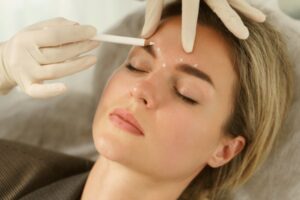Acne can seriously impact our self-esteem. Not only can it affect how we feel about our physical appearance, but studies have also found that the side effects of facial acne can include everything from anxiety and depression to severe psychological distress. If you’re suffering from acne, you’ll want to clear it up as soon as possible. With Botox touted as the latest remedy for clear skin, you’re probably wondering – does Botox help acne?
How Does Botox Help Acne?
Suppose you’re vaguely familiar with Botox already. In that case, you’ll know that it’s used to treat fine lines and wrinkles by freezing the muscles in the face to prevent signs of aging. When it comes to treating acne, Botox functions similarly: however, instead of disabling the facial muscles, Botox disables the sweat gland neurotransmitter, meaning your face sweats less and your skin is less susceptible to breaking out. When a qualified aesthetician or dermatologist performs Botox acne treatments, this process can positively impact the skin and help prevent future breakouts.
Are Botox Treatments For Acne Safe?
In general, Botox is a safe cosmetic treatment. It was FDA-approved in 1989 and has since been widely used to treat fine lines, acne and even curb excessive armpit sweating! However, when Botox is used as an acne treatment, there are several points to keep in mind. The first obvious point is that acne occurs all over the face: this means that any Botox acne treatment would need to use excessive amounts of neurotoxins (Botox) to treat the acne thoroughly. To treat a full face of acne, the dose of botox required would be high enough to potentially impact the muscles in the face, limiting your facial expressions. Not only can excessive Botox injections create minor, temporary deformities in your appearance, but it’s not a long-term solution, and upkeep would be costly.
Does Botox Help With Acne Scars?
While you should never treat active acne, you can help improve the appearance of old scars from earlier breakouts with Botox. Botox works by using neurotoxins to relax the facial muscles, putting less stress on existing scar tissue and making them less visible as a result. However, botox cannot fill scars, so this treatment is often finished by injecting hyaluronic fillers or derma fillers into the damaged skin. You can also treat acne scars without expensive surgical procedures: acne scars respond well to chemical exfoliants, Retinols, and at-home techniques such as micro-needling.
Does Botox Help Cystic Acne?
While Botox can’t help the appearance of current cystic acne, the treatment can undoubtedly help reduce cystic acne breakouts. Cystic acne occurs when bacteria and sweat become clogged under the skin and form large, angry, red pimples, and people with oily skin are the most susceptible to this type of acne. So if you manage to reduce the amount you sweat with a botox acne treatment, these outbreaks should lessen over time.
Does Botox Help All Types of Acne?
It’s important to remember that acne occurs for several reasons, and sweat is only one contributing factor. Hormones, environmental factors, and even diet play a role in combatting cystic acne.
Before rushing to the local dermatologist to get some lunch-break Botox, try first to identify the source of your acne problem. As explained in our eBook, Unmasking Acne, acne breakouts are often be caused by underlying health issues. Thyroid problems, fungal acne, and Candida can all contribute to acne and skin breakouts, so if you’ve tried everything and your acne persists, you might want to check that there aren’t any underlying problems at play.
So, Does Botox Give You Clear Skin?
Considering the question objectively: does botox help acne? Yes and no. Botox acne treatments can certainly help clear up sweat-induced breakouts, and if you suffer from cystic acne, you’ll probably see a marked improvement with some injections. However, it’s not a quick-fix treatment, and it’s certainly not a treatment that poses zero risks. So if you’re looking to treat acne thoroughly, Botox treatments should not be your first step in treating your skin.
What Should I Do To Improve Acne?
Acne breakouts can occur for many reasons, whether hormonal, health-related, or environmental. Make sure you change your bedding sheets often and wash your skin with gentle, non-abrasive soaps. If you’re taking any medication, check with your doctor about possible side effects. And if you’re dealing with recurring flare-ups, try to clean up your diet before venturing into any other acne treatments. UnMasking Acne ranks over 170 different foods and drinks ideal for clearing up your skin.

